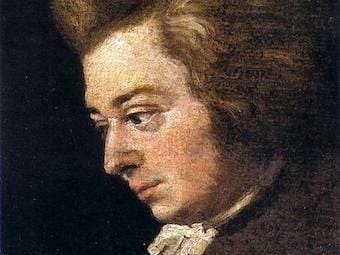475
While inspecting troops in Colchester for duty against Napoleon, the Duke of York came upon one man who gave new meaning to the word Veteran.
In September 1811, during the Napoleonic Wars, George the Prince Regent and his brother Frederick, Duke of York and Albany, were reviewing the troops of the Eastern Command on Lexden Heath, near Colchester, when they spied an elderly man wearing a uniform from a bygone age and perched on an aged pony. They asked the division’s commander General John Pitt, Earl of Chatham, what he was doing there.
Picture: By Richard Paton (1717–1791), from the Royal Museums, Greenwich, via Wikimedia Commons. Licence: Public domain.. Source.
Posted March 17 2021
476
Plutarch tells us how Alexander the Great came to bond with Bucephalus, the mighty stallion that bore him to so many victories.
Plutarch’s Parallel Lives, probably written early in the second century, compares the characters of various great men of classical Greece and Rome. Among them is Alexander the Great, the young King of Macedon who in the latter part of the fourth century BC conquered cities and peoples from Egypt to India. His horse was Bucephalus, a mighty stallion that took some conquering too.
Picture: By Antoine-Jean Gros (1771-1735), via Wikimedia Commons. Licence: Public domain.. Source.
Posted March 16 2021
477
Nothing seemed likely to stop Napoleon Bonaparte from conquering Europe, but one little fellow slowed him up a bit.
The Battle of Castiglione in northern Italy, on August 5th, 1796, was a resounding victory for Napoleon Bonaparte over the Austrian Empire. The general, who at that time was still serving the French Republic, read Helen Maria Williams’s account of his Italian campaign and told her later ‘that he would answer for the truth of all that she had reported’ — including, presumably, this poignant little scene.
Picture: © Bwierc, Wikimedia Commons. Licence: CC BY-SA 3.0.. Source.
Posted March 15 2021
478
William Wordsworth looks back on a life of disappointments and regrets, and finds in them reasons to be thankful.
William Wordsworth wrote The Prelude: or, Growth of a Poet’s Mind to account for his decision in 1799 to bury himself in Cumbria’s Lake District and devote himself to poetry. Here, Wordsworth reflects on the way that the disharmonies of our past life — our regrets and pains and disappointments — form a melody that would be less beautiful without them.
Picture: © Robert Struthers, Geograph. Licence: CC BY-SA 2.0.. Source.
Posted March 14 2021
479
An amateur composer once asked Wolfgang Amadeus Mozart how he thought of his lovely music and — for one performance only — the maestro told him.
In April 1789, Mozart quitted Vienna and embarked on a tour that took him to Prague, Berlin, Leipzig, Potsdam and Dresden. In the course of his travels he made the acquaintance of Baron V—, an amateur musician who subsequently sent him a song, a symphony and a bottle of wine. The Baron also asked him how he thought up his own wonderful music, and Mozart, most unusually, told him.
Picture: By Joseph Lange (1751–1831), via Wikimedia Commons. Licence: Public domain.. Source.
Posted March 12 2021
480
A pretty young milkmaid plans just a little bit too far ahead.
‘Don’t count your chickens before they’re hatched’ is a proverbial warning not to plan too far ahead. In this little fable, our daydreaming country milkmaid goes some way beyond counting unhatched chicks.
Picture: © Otwarte Klatki, Wikimedia Commons. Licence: CC BY-SA 2.0.. Source.
Posted March 11 2021





